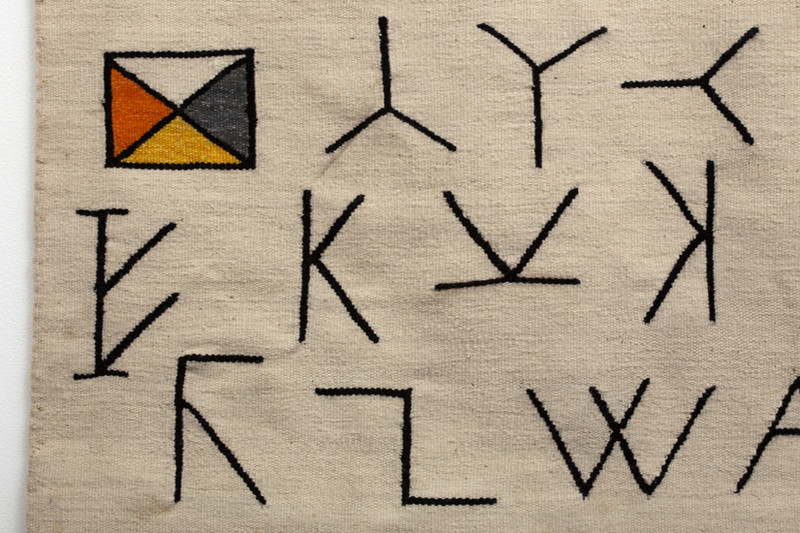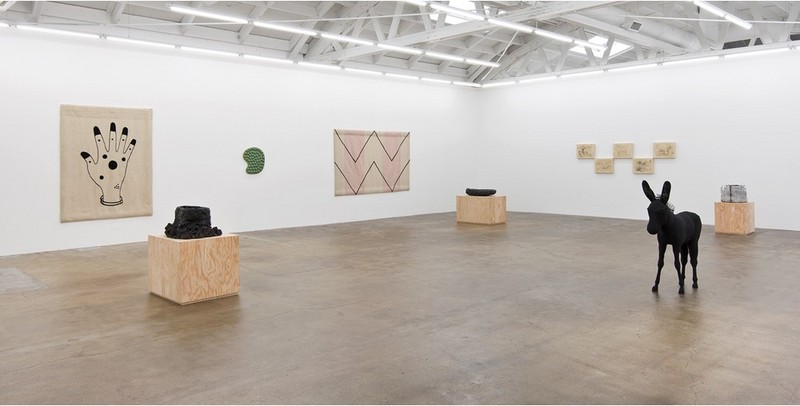Mai-Thu Perret
25 Jan - 22 Mar 2014

© Mai-Thu Perret
Untitled IV, 2014, (detail)
haute lisse hand woven wool tapestry
78.74 x 59.06 inches (200 x 150 cm)
Untitled IV, 2014, (detail)
haute lisse hand woven wool tapestry
78.74 x 59.06 inches (200 x 150 cm)
MAI-THU PERRET
Astral Plane
25 January — 22 March 2014
David Kordansky Gallery is very pleased to announce Astral Plane, an exhibition of new work by Mai-Thu Perret. The show opens on January 25 and runs through March 22, 2014. An opening reception will be held on Saturday, January 25 from 6:00 until 9:00pm.
In recent years, Mai-Thu Perret's work has addressed relationships between pure formalism, applied craft, and spiritual discourse, revealing points where seemingly contradictory approaches to object- or image-making overlap. The works in Astral Plane––including a new series of tapestries, ceramic objects, and a wicker sculpture––push these investigations a step further by subjecting formal vocabularies to degrees of visual emptiness and blankness. And though they bring together specific narratives from diverse cultural histories, many have been made using processes in which control and intentionality are offset by chance and pre-existing material conditions.
Tapestries, for instance, have bridged traditions of art, textile design, and architecture at least since the middle ages. For Perret, however, the medium also represents a way of working around the compositional problems of abstract painting. The use of natural fibers and dyes means that the tapestries featured in Astral Plane are based on a restricted color palette, one that provides a neutral backdrop to the exhibition as a whole. And while the images on them resemble pure geometric abstractions, they are informed by a variety of specific sources. These include Indian tantric art, meditation videos, and the 19th century Kindergarten movement as conceived by Friedrich Froebel, wherein educators used invented symbols––which happen to resemble of forms common in modernist painting––to instruct children in what they believed was a pre-linguistic, universal logic.
Because of its wide-ranging anthropological significance, its inherent tactility, and its dependence upon the transformative role played by fire, ceramics has long played an important role in Perret's work. Here she demonstrates several new approaches to the medium. In a series of wall-based objects on view, she has allowed a platinum glaze to undergo chemical reactions that leave it riddled with ghostly patterns evocative of nebulae or the "paranormal" entities captured by early spirit photography. Indeed, because these effects cannot be controlled once the piece enters the kiln, they are records of a process that exceeds human intervention; they are the incidental visual expressions of a non-visual phenomenon. The platinum works offer a contrast to other wall-based ceramics whose bold, saturated glazes heighten their forms, which are either handled and torn (and therefore highly expressive), or sharply defined and pop-like.
New ceramic vessels also allow for experimental use of color. Unlike the allover strategy that defines the wall-based works, however, Perret differentiates the inside and outside of these forms by applying glaze to them in distinct ways. Their exteriors have been treated in a serene, matter-of-fact fashion, with drips and other marks typical of the medium. Their interiors, meanwhile, are complex, chaotic, three dimensional environments in which the glaze has been allowed to flow and pool according to its own natural properties. The discrepancy in mood between the inner and outer surfaces of the vessels accentuates the strangeness of their shapes and scale. Reminiscent of giant cups or otherworldly baskets, they retain ties to the domestic and the utilitarian while asserting their presence as highly individual sculptural objects.
A black wicker sculpture of a donkey lends a contrasting aura of figuration to the mutability and formal openness that define the rest of the show. At the same time, its woven construction makes it a bearer of geometric patterning, and therefore representative of yet another variant of applied abstraction. However, it is the narrative possibility suggested by this beast of burden (titled Black Balthazar, after the film by Robert Bresson) that channels the underlying philosophical positions central to Astral Plane. A symbol of labor and humility, the donkey is, like the ceramic vessel, a mode of transport often considered secondary to what it is asked to carry. As such, it is also a metaphor for the fleeting, transient nature of the material world, and a reminder that all physical forms are temporary.
In 2015 Mai-Thu Perret will be the subject of a solo exhibition at the Nasher Sculpture Center, Dallas. Other solo exhibitions include The Adding Machine, Le Magasin, Grenoble, France and Aargauer Kunsthaus, Aarau, Switzerland; Spectra, Mamco, Geneva; Winner of the "Zurich Art Prize" 2011: "I dream of the code of the west", Haus Konstruktiv, Zurich; Love Letters in Ancient Brick, Theatre de l'Usine, Geneva and Swiss Institute – Contemporary Art, New York; An Ideal for Living, University of Michigan Museum of Art, Ann Arbor; 2013, The Aspen Art Museum; New Work, San Francisco Museum of Modern Art; An Evening of the Book and Other Stories, The Kitchen, New York; and And Every Woman Will Be A Walking Synthesis Of The Universe, The Renaissance Society, Chicago. Group exhibitions include Decorum, Musée d'Art Moderne, Paris; Pattern: Follow the Rules, Eli and Edythe Broad Art Museum, Michigan State University, East Lansing and Museum of Contemporary Art, Denver; Anti-Establishment, CCS Bard Hessel Museum, Annandale-on-Hudson, NY; The Old, the New, the Different, Kunsthalle Bern; ILLUMInations, International Pavilion, 54th Venice Biennale; and Goldene Zeiten, Haus der Kunst, Munich.
Astral Plane
25 January — 22 March 2014
David Kordansky Gallery is very pleased to announce Astral Plane, an exhibition of new work by Mai-Thu Perret. The show opens on January 25 and runs through March 22, 2014. An opening reception will be held on Saturday, January 25 from 6:00 until 9:00pm.
In recent years, Mai-Thu Perret's work has addressed relationships between pure formalism, applied craft, and spiritual discourse, revealing points where seemingly contradictory approaches to object- or image-making overlap. The works in Astral Plane––including a new series of tapestries, ceramic objects, and a wicker sculpture––push these investigations a step further by subjecting formal vocabularies to degrees of visual emptiness and blankness. And though they bring together specific narratives from diverse cultural histories, many have been made using processes in which control and intentionality are offset by chance and pre-existing material conditions.
Tapestries, for instance, have bridged traditions of art, textile design, and architecture at least since the middle ages. For Perret, however, the medium also represents a way of working around the compositional problems of abstract painting. The use of natural fibers and dyes means that the tapestries featured in Astral Plane are based on a restricted color palette, one that provides a neutral backdrop to the exhibition as a whole. And while the images on them resemble pure geometric abstractions, they are informed by a variety of specific sources. These include Indian tantric art, meditation videos, and the 19th century Kindergarten movement as conceived by Friedrich Froebel, wherein educators used invented symbols––which happen to resemble of forms common in modernist painting––to instruct children in what they believed was a pre-linguistic, universal logic.
Because of its wide-ranging anthropological significance, its inherent tactility, and its dependence upon the transformative role played by fire, ceramics has long played an important role in Perret's work. Here she demonstrates several new approaches to the medium. In a series of wall-based objects on view, she has allowed a platinum glaze to undergo chemical reactions that leave it riddled with ghostly patterns evocative of nebulae or the "paranormal" entities captured by early spirit photography. Indeed, because these effects cannot be controlled once the piece enters the kiln, they are records of a process that exceeds human intervention; they are the incidental visual expressions of a non-visual phenomenon. The platinum works offer a contrast to other wall-based ceramics whose bold, saturated glazes heighten their forms, which are either handled and torn (and therefore highly expressive), or sharply defined and pop-like.
New ceramic vessels also allow for experimental use of color. Unlike the allover strategy that defines the wall-based works, however, Perret differentiates the inside and outside of these forms by applying glaze to them in distinct ways. Their exteriors have been treated in a serene, matter-of-fact fashion, with drips and other marks typical of the medium. Their interiors, meanwhile, are complex, chaotic, three dimensional environments in which the glaze has been allowed to flow and pool according to its own natural properties. The discrepancy in mood between the inner and outer surfaces of the vessels accentuates the strangeness of their shapes and scale. Reminiscent of giant cups or otherworldly baskets, they retain ties to the domestic and the utilitarian while asserting their presence as highly individual sculptural objects.
A black wicker sculpture of a donkey lends a contrasting aura of figuration to the mutability and formal openness that define the rest of the show. At the same time, its woven construction makes it a bearer of geometric patterning, and therefore representative of yet another variant of applied abstraction. However, it is the narrative possibility suggested by this beast of burden (titled Black Balthazar, after the film by Robert Bresson) that channels the underlying philosophical positions central to Astral Plane. A symbol of labor and humility, the donkey is, like the ceramic vessel, a mode of transport often considered secondary to what it is asked to carry. As such, it is also a metaphor for the fleeting, transient nature of the material world, and a reminder that all physical forms are temporary.
In 2015 Mai-Thu Perret will be the subject of a solo exhibition at the Nasher Sculpture Center, Dallas. Other solo exhibitions include The Adding Machine, Le Magasin, Grenoble, France and Aargauer Kunsthaus, Aarau, Switzerland; Spectra, Mamco, Geneva; Winner of the "Zurich Art Prize" 2011: "I dream of the code of the west", Haus Konstruktiv, Zurich; Love Letters in Ancient Brick, Theatre de l'Usine, Geneva and Swiss Institute – Contemporary Art, New York; An Ideal for Living, University of Michigan Museum of Art, Ann Arbor; 2013, The Aspen Art Museum; New Work, San Francisco Museum of Modern Art; An Evening of the Book and Other Stories, The Kitchen, New York; and And Every Woman Will Be A Walking Synthesis Of The Universe, The Renaissance Society, Chicago. Group exhibitions include Decorum, Musée d'Art Moderne, Paris; Pattern: Follow the Rules, Eli and Edythe Broad Art Museum, Michigan State University, East Lansing and Museum of Contemporary Art, Denver; Anti-Establishment, CCS Bard Hessel Museum, Annandale-on-Hudson, NY; The Old, the New, the Different, Kunsthalle Bern; ILLUMInations, International Pavilion, 54th Venice Biennale; and Goldene Zeiten, Haus der Kunst, Munich.

